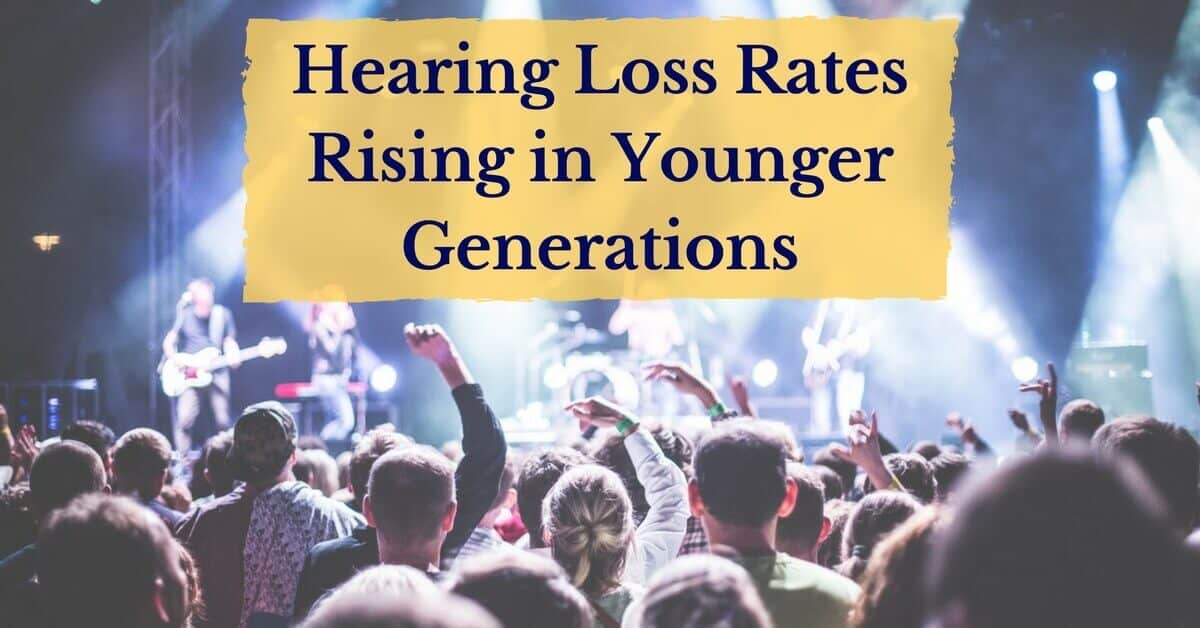
Do you ever assume that hearing loss is something that only affects seniors? Like most people, this is a common belief – and it could put your hearing at risk. Hearing loss can affect anyone, from those who work on noisy job sites to people exposed to excessive traffic noise, sports fans that spend weekends at the sporting venue, or young people who enjoy Saturdays out at the loud bar. Though hearing loss tends to affect a great number of older Americans, your age alone won’t save you from hearing loss! In recent years, we’ve seen an alarming trend in rising rates of hearing loss in younger generations.
Rates of Hearing Loss on the Rise
For many young people, it’s getting harder and harder to hear. The Centers for Disease Control and Prevention estimate that 20% of people in their 20s have hearing loss! Most young people aren’t thinking about their hearing, and many don’t even realize they have hearing loss. As they gradually lose the ability to hear high pitched sounds or very soft sounds, young people aren’t noticing their hearing loss. In fact, many people who think they have excellent hearing actually show some permanent hearing loss when tested.
Noise Induced Hearing Loss
Noise induced hearing loss (NIHL) can affect anyone. Any activity that is too loud will damage the fragile hair cells of your inner ear, and start to chip away at your hearing. These hair cells are responsible for translating the sound waves entering your ear into electrical impulses the brain can understand and interpret. With damaged hair cells, your brain won’t ever receive information about the sounds happening around you, and you’ll experience hearing loss.
Noise induced hearing loss is often gradual, as you are exposed to loud sounds every day that place a strain on your hearing. This includes noisy workplaces, university cafeterias, or the local pub. Hearing loss isn’t always so slow, but can happen suddenly from one extremely loud sound. Think about a gunshot at the shooting range when you’re not wearing hearing protection, or standing too close to heavy equipment like a jackhammer. You will sustain damage after just a few seconds!
Why Are Young People Losing Their Hearing?
Hearing loss among young people is a lot more subtle than it used to be. Workplaces aren’t the main cause of hearing loss for young people; it’s the everyday noises we take for granted like the loud concert you attended last weekend or the lawnmower you used for an hour this afternoon.
Why are younger generations experiencing hearing loss? They haven’t been on noisy jobsites for years, and don’t seem to be surrounded by noise. To find the answer, look closely. Earbuds are the perhaps the greatest threat to hearing. Many young people listen to music or web content with earbuds stuck deep into their ears, close to the delicate hair cells of their inner ear. Even though you can’t hear their music, this constant earbud use is causing rates of hearing loss in younger people to skyrocket. They often listen for hours every day, often at unsafe volumes.
Protect Your Hearing
It’s important to understand the risks to hearing health, and keep your hearing safe. If you’re often exposed to loud noises, always wear ear protection! Carrying earplugs in your bag can save your ears whenever you step into a loud bar, noise concert hall, or crowded city street. A good rule of thumb is if you can’t comfortably hear the person talking next to you at a normal volume, your hearing is at risk.
If you listen to music using earbuds or headphones, be cautious. Restrict the number of hours you listen, and make sure the volume isn’t too loud. If the people around you can hear music coming from your ears, it’s too loud. Turn it down! The 60/60 rule will help you here. It’s advisable to listen for 60 minutes, then take a break. Never listen at more than 60% of the volume, so you know your hearing is safe.
Think you might have hearing loss? Regardless of your age, hearing loss should never be ignored. If you or a loved one is experiencing hearing loss, visit us at one of our My Hearing Centers locations for a hearing test. We’ll help you choose the hearing aid that’s right for your lifestyle, whether you’re in your 20s or 60s.
